France, Brazil, Argentina and Spain may have qualified for the round of 16 at the 2018 FIFA World Cup but hardly any of them have performed up to expectations. Apart from Germany, who’ve been struck by the curse of the defending champions, the usual suspects are through to the knockouts. But it’s hardly been easy.
France’s victories (2-1 vs Australia and 1-0 vs Peru) were hardly enterprising and made them look disjointed. Their tepid draw against Denmark showed a remarkable lack of cutting edge despite the presence of Antoine Griezmann, Kylian Mbappe, Olivier Giroud, Ousmane Dembele and Nabil Fekir in the side among others.
Spain have looked leaky in defence, conceding five goals in three matches and winning just 1-0 against Iran. Gone are the days of absolute control over the ball and their preparations have suffered from the drama of the sacking of ex-manager Julen Lopetegui.
Brazil have Neymar trying to do everything on his own and have relied on individual magic (like from Philippe Coutinho) over collective samba.
Argentina barely made it: a draw against Iceland and thumping loss to Croatia not boding well for them against stronger sides.
Which leaves us with the very loveable Mexico and Colombia, and perennial dark horses England and Belgium. Two teams which are young, refreshing and unpredictable. And probably contenders this year as well. Because there’s something different about them in 2018.
Performances so far
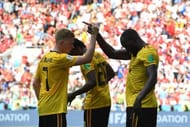
England beat Tunisia 2-1 and Panama 6-1 while Belgium beat the same opponents 5-2 and 3-0 respectively. Going into their final group game, which Belgium won 1-0, both teams were equal in all their tiebreakers.
Strikers Harry Kane (England) and Romelu Lukaku (Belgium) have been on fire, scoring a collective nine goals in two matches (neither played the final group game). The draw has been more reasonable to Belgium, who will face Japan in the last 16, while England will take on the more tricky Colombia.
But both teams have shown their strong points in 270 minutes of football - pace, direct attacking football, and incisive finishing up front.
The match between the two suffered from a slight lack of motivation and the fact that most of the regular starters were benched, but it was still better than France’s 0-0 draw with Denmark and had some promising moments - most of which came from Belgium.
The Strikers
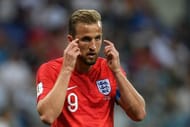
Kane and Lukaku have had impressive seasons at their clubs, with the England captain scoring 41 goals in all competitions for Tottenham Hotspur. Lukaku’s first season at Manchester United ended with him scoring 27 goals and creating nine.
With Kane, 24, and Lukaku a year older, both still have frightening potential but have already shown their quality at the World Cup. No wonder then, that their sides look short of confidence up front when they’re not playing.
The backup attack isn’t that bad either. For England, Marcus Rashford has pace but can go missing with his finishing at times, but there is Dele Alli behind Kane and he can really cause damage if he gets going - which he hasn’t yet. Raheem Sterling hasn’t brought his Manchester City form to Russia and England will hope that changes soon.
Belgium’s goal-spread is incredibly tempting. Dries Mertens (22 goals, 12 assists for Napoli), Eden Hazard (17 goals, 13 assists for Chelsea), and Kevin de Bruyne (12 goals, 21 assists for City) are all loaded with the ability to score and create from anywhere. It was also quite heartening to see young Adnan Januzaj score a worldie against England.
The Tactics
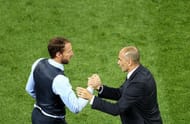
Both teams have the same 3-4-3 base with a slight tweak. While England’s manager, Gareth Southgate, usually goes with a 3-1-4-2, Belgium’s Roberto Martinez goes with a 3-4-2-1.
Both managers like their teams to express themselves, overlap with wingbacks and load midfield which giving enough freedom to the frontmen. With Argentina, Germany and France all suffering from finding the right template, it seems England and Belgium have what it takes to stick to their plan and make it work.
Both teams cancelled each other out in their clash until Belgium finally found cracks in England’s defence.
When on song, both sides can generate a lot of excitement and it will be interesting to see how they do against more competitive sides than Tunisia and Panama. Especially if their backs are against the wall.
Youth and Golden Generation
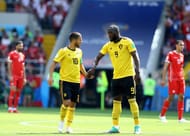
Belgium’s golden generation has finally blossomed into their prime. With an average age of 27.6 years, they are at the top of their games - with Hazard, de Bruyne (both 27), and Mertens (31) supported by the slightly younger but equally effective Lukaku (25) and Carrasco (24).
There is the senior contingent of defenders but their oldest members are Vincent Kompany and Thomas Vermaelen (both 32). Thibaut Courtois is 26 but vastly experienced. This squad has been spoken about for ages, and it’s finally culminated into winning three out of three games at the World Cup so far. They should be able to brush Japan aside with ease.
For England, this is their youngest ever World Cup squad and the third youngest in Russia. Only five of the players who went to Brazil in 2014 have managed to be selected for the 2018 edition.
They also have the least experienced squad in terms of international caps - but that didn’t stop Gareth Southgate from making some bold decisions. The likes of Alexander Trent-Arnold, Ruben Loftus-Cheek and Harry Maguire in the squad shows that the England side has been selected on merit this time.
As for Martinez, he left out Radja Nainggolan in a shock decision - but his team doesn’t seem to have missed him too much.
Clubmates and Leaguemates
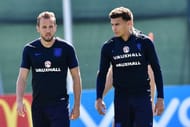
The UEFA Champions League and the World Cup have been oddly related when it comes to the tournament winners. Spain’s 2010 team had a core of the all-conquering Barcelona side - Gerard Pique, Xavi, Iniesta, Sergio Busquets and Carles Puyol - and they were at their peak powers when it came to club football.
Germany boasted of seven Bayern Munich players out of the 14 who played in the final - the same club which had reached two of the three Champions League finals before the country’s World Cup triumph. The common element between the two sides was Pep Guardiola - at Barca first, before going to Bayern.
While England and Belgium both have players trained by him this year to great success with Manchester City (Sterling, de Bruyne, Kompany, Kyle Walker, John Stones, and Fabian Delph), the England and Belgium squads do have a lot of common themes between them.
Tottenham Hotspur has supplied Kane, Alli, Kieran Trippier, Danny Rose and Eric Dier to England; Belgium’s Moussa Dembele, Jan Vertonghen and Toby Alderweireld are also from Spurs.
These are all players in important positions with experience in the most competitive league in the world - and the familiarity helps. It doesn’t always come together - Spain currently have six players from Real Madrid, but still, look slightly lost at times - but it’s a unique trait to have.
No Burden of History
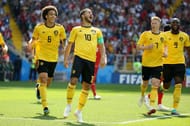
Argentina suffer under the weight of expectations and the burden of loss in the 2014 World Cup final, along with the constant pressure on Lionel Messi to prove himself at the international stage and eclipse the legacy of Diego Maradona.
Neymar and Brazil still haven’t exorcised the ghosts of that 7-1 defeat at the Maracana; France suffer from immense expectation from a side packed with high-value superstars and
Spain are trying to reach the heights of Euro 2008, World Cup 2010 and Euro 2012. Meanwhile, England and Belgium while not completely without their faults, look like the two sides which have no burden of history - something that can weigh down even the best of sides.
